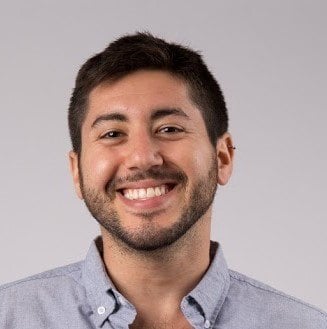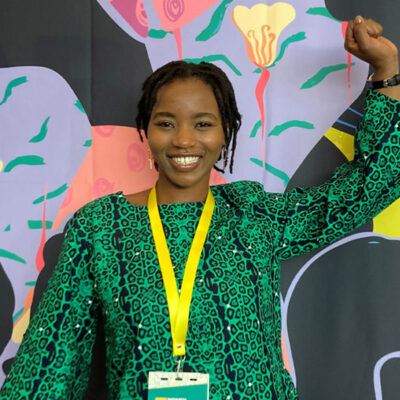“We live in a fantastic moment, when if someone gets tested and is able to access effective treatment in a supportive environment, there’s no reason they should not have a full and healthy life. We’ve made tremendous progress in recent decades, and today we have the knowledge, technology and treatments to see an AIDS-free generation ahead of us.”
That’s Javid Syed, director of AJWS’s Sexual Health and Rights department, and the hope in his voice is palpable.
The progress he speaks of is guided by UNAIDS’ ambitious 90-90-90 goals: the aspiration that by 2020, 90% of all people living with HIV will know their status; 90% of all people diagnosed with HIV will be receiving sustained antiretroviral treatment; and 90% of all people receiving treatment will have viral suppression, meaning people can live long, healthy lives and are unlikely to transmit HIV through unprotected sex.
Given the availability and sophistication of HIV treatment today, this goal should be easy to achieve; and yet, millions of people around the world—especially poor communities and oppressed minorities—are still living with and dying from untreated HIV/AIDS.
The reasons are complex—from lack of medical facilities where people live, to discrimination that bars women and sexual minorities from accessing clinics that exist, to the harmful rhetoric of world leaders and government policies that restrict funding to organizations providing AIDS services.
And yet, AJWS grantees continue to work tirelessly to build better, healthier lives and safer communities for people affected by HIV/AIDS. They’re focusing on a key step to achieving the 90-90-90 goals: enabling communities most affected by HIV/AIDS to fight for their human rights, and helping them organize to address the stigma and discrimination they so commonly face—which often empowers them to seek life-saving services.
For World AIDS Day, to advance the struggle of the activists and organizations on the frontlines of HIV/AIDS, work we asked Javid: What are five things everyone should know about defending human rights in the fight against HIV/AIDS?
- Reaching the 90-90-90 goals is possible—but it’ll take major social shifts to achieve.
The communities most affected by HIV/AIDS are often also those who are most neglected by society: adolescent girls and young women in many parts of Asia, Africa and Latin America; gay men and trans women all across the world; sex workers and others. It’s important that global aid organizations are creating clinics so more people can access treatment, but the availability of medical care doesn’t necessarily translate to receiving treatment for many of these marginalized groups. There are barriers that may keep them away: social stigma around AIDS that discourages people from going to clinics, or gender norms about sexuality that make it shameful for girls in many communities to reveal they are sexually active.
And this is not just an issue of countries in the Global South. Let’s take a young, black, queer, HIV-positive man in a Southern state in the U.S. There are high levels of HIV infection and death among this community, but the stigma and disinformation about sexuality and gender create massive barriers for them to access life-saving services. Despite the fact that those services are likely very close by, they may seem very, very far away.
To overcome these barriers, we need to build bridges to communities affected by HIV and stigma, to make sure that all people can access the incredible medical advancements that should be available to all of us who need them.
- Hateful rhetoric from our leaders is a dangerous hindrance to overcoming HIV here and around the world.
Unfortunately, today global leaders increasingly use racist, sexist, homophobic and anti-immigrant rhetoric that fuels the vulnerability of these communities most in need of support. These sentiments are also translating into policies that undermine health and human rights. Here in the U.S., President Trump’s lack of protection for the human rights of huge swaths of American people—women, minorities, transgender people, many of them communities deeply affected by HIV—contributes to a climate where these populations may feel less safe seeking treatment or even getting tested.
What’s more, this attitude emboldens leadership in other countries to spew hate speech against vulnerable minorities. And when legislators, clergy and community leaders are emboldened to publicly hold homophobic, disrespectful views, it foments these same views within communities.
- President Trump’s expanded Global Gag Rule is causing damaging effects on communities most vulnerable to HIV/AIDS.
One great thing about the United States’ HIV/AIDS response is that it has bipartisan support. The U.S. President’s Emergency Plan for AIDS Relief (PEPFAR) was created in 2003, under President Bush, and it has continued to provide important resources and funding. And yet, there is a trumped up threat that has prevented this vital funding from reaching millions of people who need it to treat their HIV.
President Trump has drastically expanded the Mexico City policy—which most people call the Global Gag Rule. The policy prevents foreign NGOs from receiving U.S. global health funding if they provide, advocate for or even refer people to abortion services. The result is that the U.S. has restricted its funding from reaching a broad array of health centers worldwide—many of which also work with people with HIV/AIDS. Under Trump, the policy now applies to all $8.8 billion dollars of U.S. global health funding—so the effect is huge.
This policy, though it’s not ostensibly targeted at HIV providers, is creating barriers for many HIV service providers that also promote reproductive health and rights. These providers now are faced with the horrendous choice if they want to keep U.S. funding: to provide life-saving HIV services to their clients in need, they must stop offering—or even talking about—abortion services, which means that other clients will likely pursue these services in unsafe, life-threatening ways.
- Grassroots organizations are the key to helping people with HIV/AIDS fight for their rights to live with dignity, as parts of strong, supportive communities.
The vast majority of global HIV/AIDS funding is going directly to biomedical services—important clinics, treatment, medication. AJWS’s response to this crisis aims to advance the human rights of communities most affected, helping them overcome the barriers that block them from seeking these services. Our HIV/AIDS work ties together the personal, political and medical; AJWS’s grantees are building communities to give people a sense that they have rights that should be valued and respected. Here are just a few grantees that truly inspire me on World AIDS Day:
In El Salvador, Asociación Diké de mujeres y hombres transgénero y LGBTI+ (Diké LGBTI+) runs the country’s only community-led clinic to provide healthcare services for transgender people—a community with very high prevalence of HIV. But they work beyond healthcare, addressing transphobia and the stigma and discrimination against people living with the disease. They are also a part of a coalition of LGBTI groups leading national and international advocacy advancing the human rights for people across the gender and sexuality spectrum. It’s truly groundbreaking work.
The Liberia Initiative for the Promotion of Rights, Diversity and Equity (LIPRIDE) is a coalition of 18 civil society organizations documenting human rights violations experienced by discriminated populations, especially people living with HIV/AIDS, sex workers and LGBTI people. They’ve established strong connections with allies within Liberia’s Ministry of Health, Ministry of Justice and National Human Rights Commission, and they’re influencing policy makers and local media to shape a more respectful public view of these communities and to challenge and overcome stigma.
And in India, AJWS supports SANGRAM, which has been organizing sex workers and women with HIV/AIDS to advocate for their rights for decades. The volunteer organization distributes condoms, teaches women self-defense and promotes new laws that would create a safer work environment. UNAIDS credited SANGRAM with making HIV treatment more accessible in Maharashtra, where they’re based. The organization now serves as a training ground for other NGOs fighting AIDS in rural India.
And these are just a few of our grantees fighting for the human rights of people with HIV/AIDS—and it’s a fight I believe we will win.
- We all have a role to ensure the world’s most vulnerable people realize their human rights.
Jews share a history in which many of our communities were seen as simply dispensable. During the Holocaust, so many people knew that lives were being lost, but didn’t respond with enough outrage to halt that loss of life—including in the U.S. Remembering that history, AJWS’s mission is to stand in solidarity with people whose lives are being diminished, people considered pariahs in their own communities.
In the countries where AJWS works, the most vulnerable populations—gay men, trans and intersex people, women and adolescent girls, and sex workers—are also those most vulnerable to HIV. This is who is left behind in the bigger picture of mainstream human rights agendas in most of the countries where we work—so that’s who we support.
Our Jewish values demand solidarity with these people—within our own Jewish communities and around the world. And seeing our solidarity translate beyond emotional and spiritual connections, to actual support and providing life-changing resources, is deeply meaningful to us as an organization.
***
The world has solved a critical part of the HIV/AIDS problem—unlocking the key to a powerful treatment regimen that unequivocally saves lives. But to reach UNAIDS’ ambitious 90-90-90 goal, where 90% of people living with HIV are receiving treatment and living long and healthy lives, we must fight stigma and prejudice, defend the human rights of the most vulnerable populations, and stand up, as a global community, to insist that the dignity and humanity of all people are respected. This is possible—and we can be part of the solution.
 Justin Jacobs is a Senior Marketing and Storytelling Officer at AJWS.
Justin Jacobs is a Senior Marketing and Storytelling Officer at AJWS.

